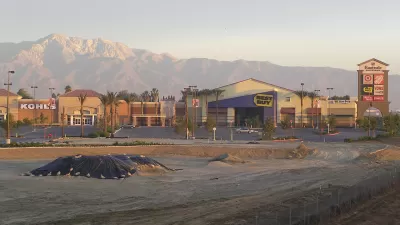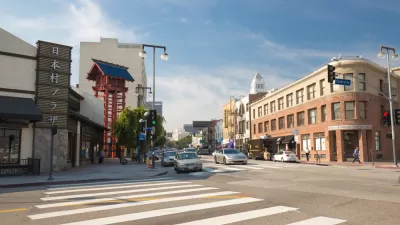The State of California has shifted from measuring "Level of Service," a grade based on how many cars pass through an intersection in a given time, to assessing overall Vehicle Miles Traveled (VMT) in its Environmental Quality laws.
After a yearlong effort by the Governor's Office of Planning and Research (OPR), and legislation passed last year, California has shifted from measuring LOS to VMT. According to Damien Newton and Melanie Curry of Streetsblog, this shift represents the changing priorities of California to encourage projects that meet environmental, multi-modal transportation, and infill development goals.
Previously, LOS required time and money to conduct expensive traffic analysis studies, and subsequent mitigation measures. These factors limited the capabilities and effectiveness of projects aiming to reduce car dependency. As opposed to LOS, VMT is, "easier and faster to estimate, and produces a measure of a project’s effect on overall travel, rather than just focusing on delay caused to cars at certain intersections." With this change in policy, "projects that are shown to decrease vehicle miles traveled–for example, bike lanes or pedestrian paths, or a grocery store that allows local residents to travel shorter distances to shop–may be automatically considered to have a 'less than significant' impact under CEQA."
Further revisions may need to be created as the proposed guidance still awaits the formal rulemaking process. OPR welcomes public comments on the draft. Send them by 5 pm, October 10, to: [email protected].
FULL STORY: California Has Officially Ditched Car-Centric ‘Level of Service’

Alabama: Trump Terminates Settlements for Black Communities Harmed By Raw Sewage
Trump deemed the landmark civil rights agreement “illegal DEI and environmental justice policy.”

Planetizen Federal Action Tracker
A weekly monitor of how Trump’s orders and actions are impacting planners and planning in America.

Why Should We Subsidize Public Transportation?
Many public transit agencies face financial stress due to rising costs, declining fare revenue, and declining subsidies. Transit advocates must provide a strong business case for increasing public transit funding.

Understanding Road Diets
An explainer from Momentum highlights the advantages of reducing vehicle lanes in favor of more bike, transit, and pedestrian infrastructure.

New California Law Regulates Warehouse Pollution
A new law tightens building and emissions regulations for large distribution warehouses to mitigate air pollution and traffic in surrounding communities.

Phoenix Announces Opening Date for Light Rail Extension
The South Central extension will connect South Phoenix to downtown and other major hubs starting on June 7.
Urban Design for Planners 1: Software Tools
This six-course series explores essential urban design concepts using open source software and equips planners with the tools they need to participate fully in the urban design process.
Planning for Universal Design
Learn the tools for implementing Universal Design in planning regulations.
Caltrans
Smith Gee Studio
Institute for Housing and Urban Development Studies (IHS)
City of Grandview
Harvard GSD Executive Education
Toledo-Lucas County Plan Commissions
Salt Lake City
NYU Wagner Graduate School of Public Service




























